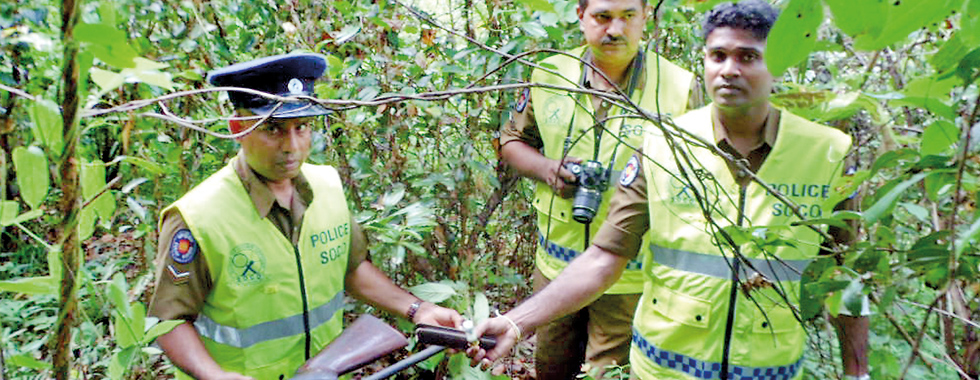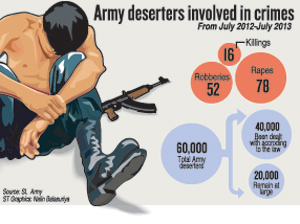News
Brutal crimes on the rise
It was a grey morning that promised rain later on when the 49-year-old housewife-Anula Herath along with her 10-year-old daughter left their home in Kahatuduwa and headed for the Dhaham Pasala at the local temple last IL Poya Day little realizing that it would be her final moments. The woman dropped her daughter at the Dhaham Pasala and began her return journey home when she was confronted by her estranged husband.
A heated argument broke out between the two and without warning the husband who had arrived in his three wheeler rammed the vehicle on to the woman who was sent sprawling across the street. Thereafter the man pulled out a seven-inch long dagger and repeatedly drove the blade into the fallen woman killing her on the spot before riding away leaving the bloodied corpse on the roadside, according to eye witnesses.
The suspect later consumed a sizeable quantity of alcohol before taking his own life with a massive dose of pesticide.
Both incidents took place in the space of little under two hours and at the end a child was left orphaned while relatives mourned the deaths of the adults.
At the time of the incident divorce papers had been filed by the woman before a local magistrate but the motive for the killing still remains a mystery. It is also learned that the man had attacked his wife on a previous occasion and had been warned by police to stay away from her.
This killing at Kahathuduwa was followed by another similar incident two days later at a military post on the peak of the Pidurutalagala Mountain range in Nuwara Eliya. In this case an airman shot dead a colleague with a semi-automatic assault rifle before using the same weapon on himself.

The scene of the crime at Hakmana-Kamburupitiya. Pic by Krishan Jeewaka Jayaruk
The motive for the killing, according to police was a personal grudge. The two incidents that claimed four lives are among 14 homicides that took place in several parts of the country in November. At the start of the month five people in a single family were butchered in a night of terror at a quiet village of Haldamulla in Anuradhapura by a serving army corporal who later went on to rob Rs. 350,000 from his victims.
The dead included two children, their parents and another relative and they were all brutally stabbed to death by the suspect who was apprehended five days later along with part of the loot.In the third week of November an anti-vice policeman was shot dead and his wife stabbed to death by a group of armed men who had stormed their home around midnight at a village in Hakmana-Kamburupitiya. Investigators later found out that it was a revenge killing carried out by local drug dealers since the policeman had repeatedly targeted their operations.
The man who led the gang was an army deserter and he along with two other suspects later died in police custody under questionable circumstances. In yet another unexplained double murder 50-year-old Lal Priyantha and his 45-year-old wife Anusha Liyanage were brutally slain while returning home in Halgasmulla-Akmeemana on November 19. The couple have four children.
The killings in November make up a total of 450 killings, a drop by 15 per cent when compared with the previous year that saw around 646 cases, according to police and military statistics. However, the killings this year were of a more brutal nature where the killers went on to wipe out entire families irrespective of gender or age apparently in a bid to wipe out evidence or eyewitness accounts, Police Spokesperson Senior Superintendent (SSP) Ajith Rohana said.
He added that although army deserters and ex-servicemen were involved in some highly publicised killings their overall involvement was minimum, amounting to two per cent of the entire total of killings. From the period starting from July 2012 to the same month of this year army deserters and military personnel were involved in 16 killings from a total of 599, 78 rape cases from a total of 2295 and 52 robberies from a total of 5650, SSP Rohana said. He added that from 60,000 known army deserters 40,000 had already been dealt with according to the law but the remaining 20,000 remained at large and there was a threat of their being involved in crimes in the future.
In regard to military personnel getting involved in brutal killings former senior policemen summed it up to ‘gun culture’ the outcome of the 30-year-old conflict
Most of the soldiers who were sent to the frontlines during the height of the fighting between the security forces and the LTTE came from humble village homes and after being part of the military campaign they returned home as hardened men who had lost all fear.

“It is these individuals who maintain a mindset that they can do anything and getaway without being apprehended. This is sad because most of them end up getting caught and are forced to spend much of their future years in the country’s jails’, says former Senior Deputy Inspector General (SDIG) Nimal Mediwaka.
He added that the present day rise in crime was due to more than one factor. “There are the economic reasons, frustration, non availability of decent employment, social stigma among a string of other issues, and this is where the authorities must address the matter without delay,” he said.
“Not only in Sri Lanka but in other countries even in the US where citizens have been involved in fighting wars there is always a fall out when the fighting comes to an end. “In the US many veterans in the military campaign in Vietnam got increasingly involved in crime and related issues and the pattern is some what the same here.
“This has to be understood and the matter treated accordingly. After all the men and women who joined the military ranks and were forced to fight, sometimes in the most barbaric conditions did not start the war themselves,” Mr. Mediwaka said.
He said for a start relevant authorities should re-start the vigilante committees involving the police, school and places of religious worship in a bid to prevent crime. In this context he said it was important for the police to build up confidence among the general public so that both parties could work together, but sadly this is not the case and it needs to be changed, he added.
He also suggested a police academy system where recruits undergo a three year course of Criminology where they could study law, computer and to a lesser extent English Language before being considered for active duty in the department.
“This is important. Because these officers who will come into contact with the public knowledge of this nature would make their work easier and more people friendly.
The law must also be adjusted if not changed where punishments are made more severe to avert criminal activity,” he concluded. Senior DIG retired H. M. G. B. Kotakadeniya told the Sunday Times that the rise in crime could be largely attributed to inefficiency of the policemen on the beat because they are not allowed to carry out their duties owing to political interference at nearly every level.
“Honest and efficient police officers who refuse to be ‘hurrah boys’ of politicians are sidelined and kept in limbo while those who toe the line are given top places and to hell with merit and all that,” Mr. Kotakadeniya, currently a sitting member for the ruling People’s Alliance (PA) in the Western Provincial Council (WPC) said.
He said it should be the responsibility of the Inspector General of Police (IGP) to sanction promotions and placements of police officers since he had access to the personal details and performance of an individual. “But this is not the case today, and the IGP is kept in the dark by divisional heads who have ended up as ‘lap dogs’ of politicians.
He said a case in point was the recent incident at the Talangama Police station where the OIC and three others were indicted for allegedly covering up an investigation into a contract killing where a wealthy businesswoman from Colombo is allegedly involved.
“In this case the OIC had repeatedly boasted that he was a close relative of a Cabinet Minister, so much so that he was able to return to the same police station just one month after he was given a routine transfer.
“If the crime rate is to be reduced the police will have to be straightened out and the IGP given wider powers when dealing with promotions and placements of officers,” he said.


